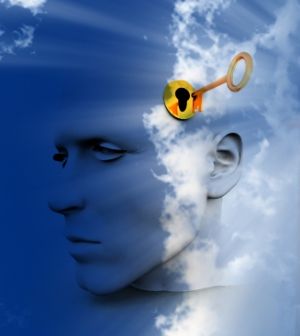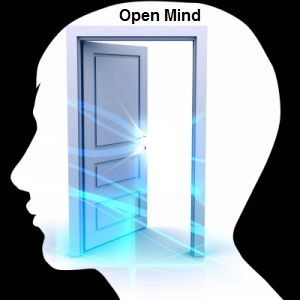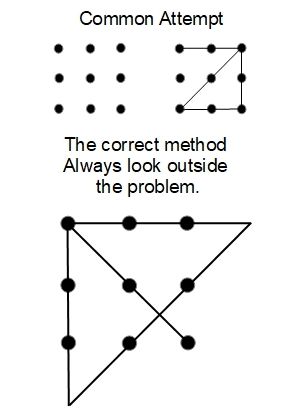Beliefs and Assumptions (Understanding Ourselves)

In the previous section, when discussing "The Evolution of the Human Mind", I suggested how unique the human mind has become given our capacity of abstract thought. Our ability to use abstract thought allows us to conceive and construct amazing technologies, but it also has caused us to create a virtually infinite number of belief systems.
Though competing economic interests have a big influence on preventing countries from working together, conflicting belief systems can have an even greater impact. With such different ideas on religion, discrimination, and what is right and wrong, how can countries expect to establish a Universal Philosophy to help implement global policies and ensure the welfare of Life and Earth?
The following sections will discuss how we make assumptions, how we create our belief systems, and ultimately, how we create our interpretations of reality. My hope is that if we can better understand how we establish our unique belief systems, we can learn to modify them so that countries can reduce conflicts over beliefs such as religions. Going further, we may be able to establish a Universal Philosophy that can be integrated with belief systems, whereby we can agree on key issues in order to ensure the brightest future possible for Life and Earth.
How we make assumptions and create our beliefs
Each of us already has our own interpretation of the world, part of it is from instinct, and much of it is learned. From the day we are born, we begin to learn and interpret the world based on the experiences we have from the environment around us. It does not take us long to assume that the sun will rise each morning after we have seen the same pattern over and over again. Once we can make such assumptions, we then no longer need to think about them. It is efficient. Assumptions allow us to build an interpretation of the world around us. They make the process of learning easier, but at the same time the assumptions we have already made can be our greatest obstacles to accepting new ideas, values, and beliefs. Consider the following examples of assumptions that human beings have been known to make:
-
The story of the astronomer Galileo. In his time, the assumption was that all the planets and stars encircled the Earth. The Earth was considered to be the centre of the universe, which of course is not the case. It is worth noting, that part of the reason for this thinking was, not only the observation that it "appeared" that the planets went around the Earth, but also the ego of humankind was somewhat boosted by the thought that it was the centre of all things. As a result, these assumptions caused humankind to interpret the world inaccurately, even to the point that Galileo was "accused of heresy" for his revolutionary suggestions. Can you imagine being a student at that time? You would accept as fact, without question, that the Earth was the centre of the universe. Can you imagine, how in making this assumption, it would be very difficult to explain new observations about astronomy because they simply would not be consistent with this false assumption? Ultimately, years later, Galileo's observations that the Earth and planets circled the sun became accepted.
-
Let's consider another example about how we assume and cannot help but do so. When looking at an object, we think it is the object we see, but it is really the light being reflected from the object that we see. Further, we might think we are seeing objects instantly, but actually the reflected light that we see bouncing off the object really arrives to us with a "delay" based on the time the light took to get to us. For example, if the sun were to have a major change, or explosion, we actually would not see this event until about 499 seconds later because that is roughly the amount of time it takes the light to travel from the sun to tell us it had exploded. This is a simple calculation done by dividing the speed of light, which is 186,282 miles per second, into the number of miles the Earth is from the sun, 93,000,000 miles. Nevertheless, whether it is the sun or any object, we interpret the world inaccurately by assuming we are seeing everything instantly. In case you don't know, a light year, which is a term you have probably heard of, is the distance that light travels in one year, nearly 6 trillion miles.

-
While on the subject of light, think of a rainbow. Sometimes we assume a rainbow just lies before us and we can reach out and touch it. Nevertheless, the rainbow really has no fixed location in the sky since its position really depends on the location of the viewer and the sun. The various colours in the rainbow are just different wavelengths of light that are being refracted by droplets of water in the sky as the light enters and exits the droplets.
-
I want to put forth another idea regarding how we make assumptions. Imagine a child who is brought up in a country where most aspects of life revolve around a specific religion. It does not matter where, or what religion. For example, we will say that in a specific country Religion A is a popular religion. The child grows up going through the process of engaging with the surrounding community of those who follow the same general ethics and beliefs within the religion. As the person comes to define themselves around these beliefs, whether true or not, consider this question: "What if the same person had been born in another country where Religion B might be the prevailing religion?" Assuming the child was only exposed to Religion B, one might suggest that the child would tend to follow the beliefs of that religion and engage in its community. My point to this example is that based on our experience and background, we learn to make assumptions about the world that could quite easily have been different if our background had been different. It is important to recognize that our established beliefs, based on our background and past experiences, could easily have been quite different had our past been different.
The preceding examples are a reminder that we all make assumptions about the world, and questioning them from time to time might help us learn and adapt. Going further, in some cases, it simply may not be possible for us to make accurate assumptions without special instruments. This is shown with the example noted above where we assume that we see things instantly with our eyes, but it is really just the reflected light that we are seeing. Regardless of the assumptions we make, if our belief systems (e.g. religions) rely on inaccurate assumptions, then they may not reliably reflect the way the physical world actually works. This can leave us searching for answers to support already inaccurate belief systems. I think that we need to accept that sometimes our ego, our insatiable need for quick answers, and the physical limitations of our senses, can leave us open to inaccurate interpretations of the world. I am not suggesting that any specific beliefs of the world are right or wrong. I am only suggesting that it is now more important than ever that humankind keeps an open mind so that we can find accurate interpretations of the world. This is especially important in our new age of rapidly developing technologies that are having a greater and greater impact on Life and the fragile Earth. The cost of making mistakes about how we interpret our world is becoming bigger and bigger.
Our belief systems

I have discussed a bit about how important it is to open our minds to questioning our assumptions and belief systems. Even when some of us know we may be wrong, we hesitate to change our beliefs because, once established, it is a big investment in time and energy for us to rethink things. As we go through life we build our world and beliefs like creating a building. We pour the cement, build the frame, and place the walls. We accept ideas and build a foundation - a system of assumptions and beliefs. Once we have built our foundation it is a big investment to go back and start over. We may even hesitate to change how we interpret the world, even if we know our interpretation is not exactly representative of the physical reality that we face in order to survive.
In addition, how our foundation is constructed also affects what we are willing to add to our beliefs. For example, if a building is made of cement one can add a metal roof, but if it is a building of straw this is not possible. Similarly, once we have built our beliefs basing them on certain assumptions, it becomes difficult to accept ideas that are not consistent with the foundation we have already created.

An example that I mentioned earlier was when the world had built a foundation on the belief that the Earth was the centre of the universe. It was a big change to accept that this belief might not be accurate. Nevertheless, if we still believed in the inaccurate assumption that Earth is the centre of the universe, we would have a lot of difficulty explaining the new things we have learned about astronomy since then. The metal roof would just not work on the straw foundation.
You may have heard of the old saying "you can't teach an old dog new tricks". In a sense, this cliche is very true and it can apply to countries as well as individuals. As we get older and more established our "foundation" solidifies, just as do our belief systems, and this can cause us to be a lot less accepting of new ideas. We protect our beliefs with a passion and reinforce them when we can, often by connecting with those who have similar beliefs. Beliefs are what we rely on to move about in our world, and if they work, even if not entirely representative of events as they truly occur in the world around us, we still resist changing them. This can prevent us from adapting to the rapidly changing world that we live in. It follows that it is so important for us to ensure that children are educated with accurate interpretations of the world while their minds are still open. This might, for example, come in the form of a global Universal Philosophy that would educate the young on science, philosophy, and global issues.
I would like to note at this point that in the section How a Planet Survived I have proposed a few guidelines that might be included in a Universal Philosophy. Some are that countries must work together to educate individuals regarding global issues outside of their immediate lives, that we must acknowledge how prone human beings can be to creating belief systems that may be inaccurate, and that we must emphasize the importance of greater empathy toward the world.
Over the centuries, countries and cultures have established their own beliefs about the world, but it may be that we have come to a new age where a re-evaluation of many of our beliefs is required. With the world going through such significant change, it may be especially important that we are all educated on the importance of working together so that we can deal in a unified way with global issues affecting all of us. For example, we may have beliefs that conflict about communism or capitalism, about one religion versus another religion, or about one race of people versus another race. We must understand that many of these differences might be best left alone to rest while we focus on the growing global issues that are affecting all Life and Earth.
An interesting puzzle

While we are on the subject of keeping an open mind, let's take a look at an interesting puzzle you may have seen before. For me it is always a reminder of how it is so important to question how we think, and always be willing to look outside of the problem. We need to be careful of our assumptions. I think it was my grade 8 mathematics teacher, Mr. Rippon, who showed it to me, and I always show it to friends as a fun example.
On the upper left of the image you can see 9 small dots. Simply put 9 dots on a piece of paper the same way and try to join all of them with 4 straight lines, without taking your pencil off the paper. There is an example of an unsuccessful attempt on the upper right, which is the most common approach. The answer is in the image below, clearly showing that the only way to solve the problem is by working outside of the square, or outside of the problem.
This is a simple example, but a reminder that in order to interpret the world accurately, we need to open our minds to all possibilities. If we start with specific assumptions when approaching any problem, it may be impossible to come out with the answers we seek. In the same way, due to our physical nature as human beings, and the cultural influences around us that affect how and what we learn, we may be subject to making certain inaccurate assumptions about the world - our reality. It is more important than ever that we open our minds, re-evaluate, and question exactly how we interpret the world around us. If we can succeed and interpret the world accurately, we may be able find the answers that will enable us to make the choices necessary to find the brightest possible future for Life and Earth.
In the next section I will discuss how we interpret "reality". What is this thing called reality that we all move around in, so full of wondrous things that seem to go on into infinity?
